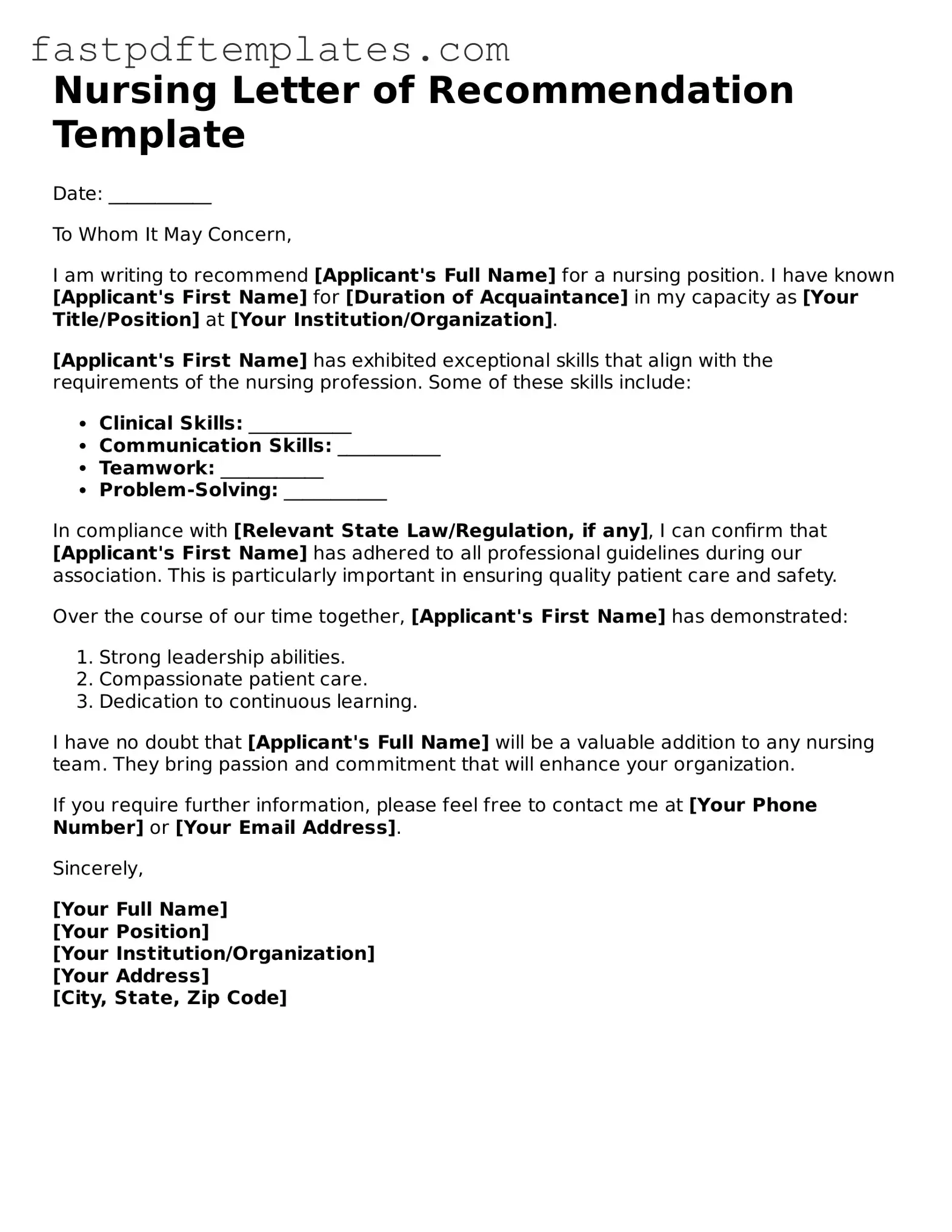The Nursing Letter of Recommendation form shares similarities with the Academic Reference Letter. Both documents serve as endorsements, providing insights into an individual's qualifications and character. An academic reference letter typically highlights a student's performance, skills, and potential in an educational setting. In the same vein, a nursing recommendation letter focuses on the candidate's clinical abilities, work ethic, and suitability for the nursing profession. Each document is crafted by someone familiar with the individual, lending credibility and weight to the assessment.
Another document akin to the Nursing Letter of Recommendation is the Employment Reference Letter. This letter is often requested by job applicants to demonstrate their work history and competencies. Like the nursing recommendation, it emphasizes the applicant's skills, contributions, and overall performance in a professional environment. Both letters aim to provide a potential employer or educational institution with a comprehensive view of the candidate's qualifications and character, thus influencing hiring or admission decisions.
The Personal Statement is also comparable to the Nursing Letter of Recommendation. While a personal statement is typically written by the applicant themselves, both documents aim to convey the individual's passion and commitment to their chosen field. The nursing recommendation highlights the candidate's strengths as observed by others, whereas the personal statement allows the individual to articulate their motivations and aspirations. Both are essential in portraying a well-rounded picture of the candidate.
The Character Reference Letter is another document that parallels the Nursing Letter of Recommendation. Character references focus on an individual's personal attributes, such as integrity, reliability, and interpersonal skills. Similarly, a nursing recommendation may touch on these qualities, particularly as they relate to patient care and teamwork. Both letters serve to validate the candidate’s character and suitability for a specific role or program.
In addition, the Graduate School Recommendation Letter bears resemblance to the Nursing Letter of Recommendation. Graduate programs often require recommendations that speak to a candidate's academic abilities and readiness for advanced study. Much like nursing recommendations, these letters provide an assessment of the candidate's skills, accomplishments, and potential for success in a rigorous academic environment.
The Professional Endorsement Letter is also similar to the Nursing Letter of Recommendation. This type of letter is often used in professional settings to endorse a colleague's skills and qualifications. Both documents are intended to support the individual’s application or candidacy by providing a third-party perspective on their abilities and contributions to the field.
The Fellowship Recommendation Letter is another document that shares characteristics with the Nursing Letter of Recommendation. Fellowships often require candidates to submit letters that speak to their qualifications and potential for success in a specific program. Both types of letters emphasize the candidate's skills and experiences, helping to paint a picture of their readiness for advanced opportunities.
The Volunteer Reference Letter is akin to the Nursing Letter of Recommendation as well. This letter highlights the contributions and impact of an individual in a volunteer capacity. Both documents emphasize the importance of character, dedication, and the ability to work well with others. They serve to illustrate the candidate's commitment to service, which is particularly relevant in the nursing profession.
Lastly, the Internship Recommendation Letter is similar to the Nursing Letter of Recommendation. Internships often require letters that assess a candidate's performance and potential in a real-world setting. Both letters focus on practical skills, work ethic, and the ability to thrive in a professional environment. They are crucial in demonstrating the candidate’s readiness for future roles in their field.

